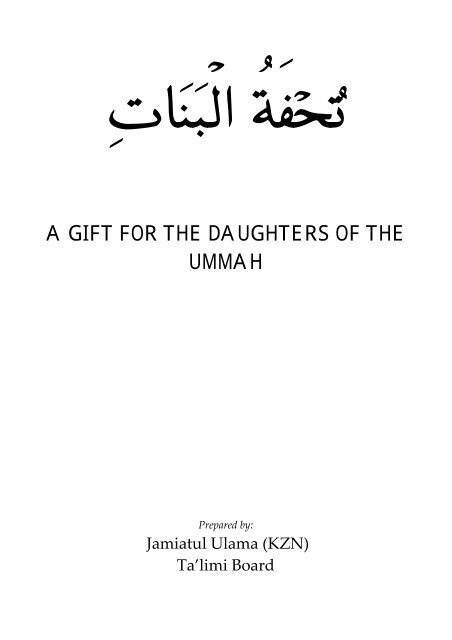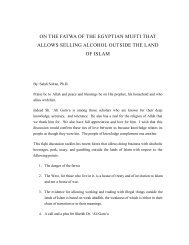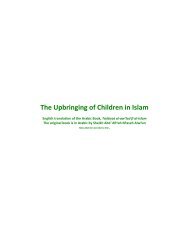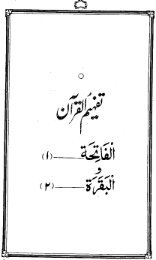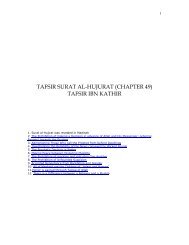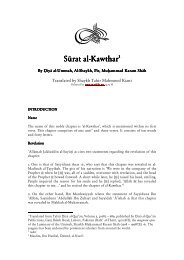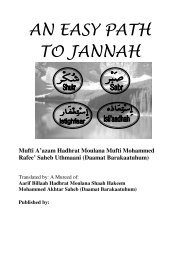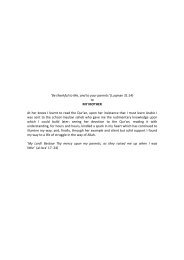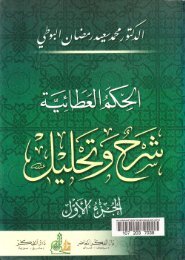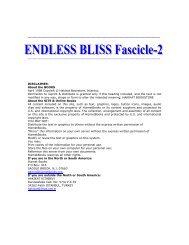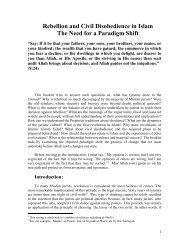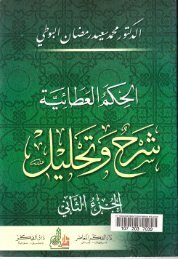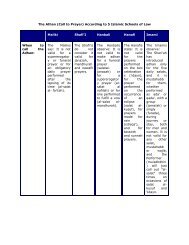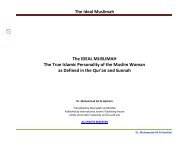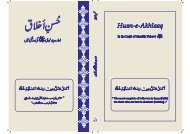A Gift for the daughters of the Ummah (Tuhfatul_Banaat)
A Gift for the daughters of the Ummah (Tuhfatul_Banaat)
A Gift for the daughters of the Ummah (Tuhfatul_Banaat)
You also want an ePaper? Increase the reach of your titles
YUMPU automatically turns print PDFs into web optimized ePapers that Google loves.
אA GIFT FOR THE DAUGHTERS OF THEUMMAHPrepared by:Jamiatul Ulama (KZN)Ta’limi Board
Title:A GIFT FOR THE DAUGHTERS OF THE UMMAHPrepared andPublished by:ßbnäíÜ잌aíØöbáÝÉÜaóïÉ»Jamiatul Ulama (KZN)Ta’limi Board4 Third AvenueP.O. Box 26024Isipingo Beach4115South AfricaTel: +27-31 912 2172Fax: +27-31 902 9268E-mail:talimiboard@webmail.co.zaFirst edition: Rajab 1428 / August 2007For <strong>the</strong> esaale - sawaab <strong>of</strong> <strong>the</strong> entire <strong>Ummah</strong> <strong>of</strong> Nabi1. Open permission is granted <strong>for</strong> reprinting <strong>of</strong> this booklet provided that it is not <strong>for</strong> gainand no alterations are made.2. A humble appeal is directed to readers to <strong>of</strong>fer suggestions, corrections, etc. to improve<strong>the</strong> quality <strong>of</strong> this publication in <strong>the</strong> future. May Allah reward you <strong>for</strong> this.3. The author, sponsors and typesetter humbly request your duas <strong>for</strong> <strong>the</strong>m, <strong>the</strong>ir parents,families, Mashaikh and Asaatidha
CONTENTS:FOREWORD ...........................................................................................................1PREFACE ................................................................................................................2INTRODUCTION ...................................................................................................3LESSON ONE .........................................................................................................4WHAT IS HAIDH? ...............................................................................................4(PERIOD / MENSTRUATION / MENSES) ......................................................................4LESSON TWO ........................................................................................................6BULOOGH (PUBERTY) ......................................................................................6LESSON THREE ....................................................................................................9SYMPTOMS OF YOUR FIRST HAIDH ..............................................................9DISCHARGES ..................................................................................................9DIFFERENT COLOUR DISCHARGES AND WHAT THEY MEAN ...........9LESSON FOUR .....................................................................................................11PERSONAL HYGIENE DURING YOUR HAIDH ............................................11HOW OFTEN DO I CHANGE MY PAD? .....................................................11WHY DO I FIND AN ODOUR WHEN I CHANGE MY PAD? ...................11HOW CAN I PREVENT THIS ODOUR FROM EMINATING? ..................11HOW DO I DISPOSE OF THE SANITARY PAD? .......................................12HOW DO I KNOW WHEN MY HAIDH HAS STOPPED? ..........................12LESSON FIVE.......................................................................................................14GHUSL AFTER HAIDH ....................................................................................14HOW SOON SHOULD I MAKE GHUSL AFTER MY HAIDH HASSTOPPED? ......................................................................................................14THE SUNNAH METHOD OF MAKING GHUSAL .....................................14FARAAIDH OF GHUSL ................................................................................14IMPORTANT POINTS TO REMEMBER .....................................................15REMOVAL OF UNWANTED HAIR AT THE TIME OF GHUSL ..............15LESSON SIX .........................................................................................................17CALCULATION OF HAIDH .............................................................................17LESSON SEVEN ...................................................................................................19DURATION OF HAIDH…… .............................................................................19LESSON EIGHT ...................................................................................................22
WHAT SHOULD YOU DO IF YOUR HAIDH STARTS WHILST YOU AREAT SCHOOL .......................................................................................................22WHAT YOU SHOULD REMEMBER IF YOUR HAIDH STARTS ATMADRASAH ......................................................................................................22LESSON NINE ......................................................................................................24HAIDH AND SALAAH ......................................................................................24LESSON TEN ........................................................................................................26TIMES OF SALAAH ..........................................................................................26LESSON ELEVEN ................................................................................................29HAIDH AND FASTING .....................................................................................29LESSON TWELVE ...............................................................................................31HAIDH AND ZIKR (REMEMBRANCE OF ALLAH ) ...........................................31LESSON THIRTEEN ...........................................................................................34ISTIHAADHA ....................................................................................................34NIFAAS ..............................................................................................................34BENEFITS OF PERFORMING SALAAH ........................................................36WARNING FOR NEGLECTING SALAAH ......................................................36SAAHIB – E – TARTEEB ....................................................................................38A LETTER TO MY BELOVED SISTER!!! .......................................................39MODESTY IN ISLAM ........................................................................................42DON’T BE SHY TO ASK………. ........................................................................47FINAL WORKSHEET- ONE MONTH LATER….. .........................................49HAIDH RECORD CHART ..................................................................................50MY HAIDH DIARY ..............................................................................................51GLOSSARY OF TERMS .....................................................................................52
A gift <strong>for</strong> <strong>the</strong> <strong>daughters</strong> <strong>of</strong> <strong>the</strong> ummahForewordAllah declared in <strong>the</strong> Qur’aan-al-Kareem: “Verily <strong>the</strong> only Deen(acceptable) by Allah is Islaam.” We <strong>the</strong>re<strong>for</strong>e can never express enoughgratitude <strong>for</strong> <strong>the</strong> favour <strong>of</strong> Islaam which Allah has blessed us with.Islaam is a complete way <strong>of</strong> life. It provides detail guidance to every aspect <strong>of</strong>one’s existence from be<strong>for</strong>e <strong>the</strong> cradle to after <strong>the</strong> grave. A Jew oncemockingly remarked to Hadhrat Salmaan Faarsi that “Your Nabi teachesyou everything including how to relieve yourself!” He intended to mock <strong>the</strong>teachings <strong>of</strong> Nabi pertaining to istinjaa, (cleansing oneself after answering<strong>the</strong> call <strong>of</strong> nature) as he felt that this was an aspect that needed no discussion.Hadhrat Abdullah bin Mas’ood was no apologist. He turned around <strong>the</strong>Jew’s intended insults into a statement <strong>of</strong> praise and responded: “Yes (indeedNabi taught as all <strong>the</strong>se details). He taught us not to make istinjaa with ourright hand, etc.” (Sahih Muslim).Deen has taught us everything in life. Included in <strong>the</strong>se teachings are <strong>the</strong>details pertaining to puberty and all related issues.Upon reaching <strong>the</strong> age <strong>of</strong> puberty, one becomes mukallaf (answerable <strong>for</strong> <strong>the</strong>fulfilment <strong>of</strong> <strong>the</strong> laws <strong>of</strong> Deen). Salaah, fasting and o<strong>the</strong>r aspects <strong>of</strong> Deenbecome compulsory. Thus, <strong>the</strong> relevant masaail must be known in advance sothat one can properly discharge one’s obligations.The book in your hands has been prepared <strong>for</strong> <strong>the</strong> very same purpose, to teachgirls <strong>the</strong> masaail and practical aspects that will affect <strong>the</strong>m upon becomingbaaligha (age <strong>of</strong> puberty). This text book will, Insha Allah, greatly assistmo<strong>the</strong>rs and mu’allimahs in imparting this essential knowledge to <strong>the</strong><strong>daughters</strong> <strong>of</strong> <strong>the</strong> <strong>Ummah</strong>.The topic is fundamentally important and also very sensitive. Teaching <strong>of</strong> <strong>the</strong>seaspects should <strong>the</strong>re<strong>for</strong>e be handled appropriately, especially when teaching anentire class.May Allah bless <strong>the</strong> compilers and all those who assisted or contributed inany and every way. May Allah grant <strong>the</strong>m barakah in <strong>the</strong>ir lives and give<strong>the</strong>m <strong>the</strong> best <strong>of</strong> both worlds. May <strong>the</strong> ummah also greatly benefit from thisbook. Aameen.Moulana Muhammad Ilyas Patel Saheb1
A gift <strong>for</strong> <strong>the</strong> <strong>daughters</strong> <strong>of</strong> <strong>the</strong> ummahPREFACEThis kitaab is dedicated to all <strong>the</strong> young sisters <strong>of</strong> this ummah. Wemake dua that Allah makes this kitaab a means <strong>of</strong> Hidaayat(guidance) <strong>for</strong> you. Insha Allah!We humbly request your duas <strong>for</strong> those who were involved incompiling this kitaab. May Allah reward <strong>the</strong>m and <strong>the</strong>ir familieswith His pleasure, grant <strong>the</strong>m sincerity, <strong>for</strong>giveness, true success inthis world and <strong>the</strong> Aakhirah and use <strong>the</strong>m <strong>for</strong> <strong>the</strong> ef<strong>for</strong>ts <strong>of</strong> His Deen.Aameen!Rabbana Taqabbal Minna Innaka Antas Sameeul Aleem Wa tubalayna Innaka antat Tawwaabur RaheemThe readers are humbly requested to kindly notify <strong>the</strong> Ta’limi Board<strong>of</strong> any errors or inaccuracies. Constructive criticism and suggestionsare also welcome. Your input will be greatly appreciated and will beconsidered in future editions.2
A gift <strong>for</strong> <strong>the</strong> <strong>daughters</strong> <strong>of</strong> <strong>the</strong> ummahINTRODUCTIONAllah has created <strong>the</strong> human being as ‘ASHRAFULMAKHLOOQAAT’ (<strong>the</strong> best <strong>of</strong> His creation). Males and femaleshave been created differently with <strong>the</strong>ir own unique physical andemotional characteristics. All <strong>the</strong>se are signs <strong>of</strong> His evident powerand greatness.A female’s first haidh (period/menstruation) is actually a transition orcrossing over <strong>for</strong> her from childhood to adulthood. It is an importanttime in her life, because along with this change comes hugeresponsibilities.Apart from physical changes (which take place inside our bodies),we undergo emotional changes (<strong>the</strong> way we feel), as well as mentalchanges (<strong>the</strong> way we understand things). It is, <strong>the</strong>re<strong>for</strong>e, veryimportant <strong>for</strong> us to prepare ourselves <strong>for</strong> this trans<strong>for</strong>mation.This body is an amaanah (trust) from Allah . We use it to make <strong>the</strong>ibaadah (worship) <strong>of</strong> Allah . There<strong>for</strong>e, it is important that we takecare <strong>of</strong> it as best we can in order to fulfil <strong>the</strong> rights <strong>of</strong> Allah .However, it is not only our physical strength and mental well-beingthat we ought to worry about, but also our personal hygiene.Allah says in <strong>the</strong> Qur’aan: “Verily, Allah loves <strong>the</strong> repentersand those who purify <strong>the</strong>mselves.” (Surah Baqarah, Aayat No. 222)Many girls who have not yet experienced <strong>the</strong>ir periods or who havejust started menstruating are ei<strong>the</strong>r unprepared or unin<strong>for</strong>med about<strong>the</strong>ir period/menstruating, leaving <strong>the</strong>m unaware as to what to do orexpect once <strong>the</strong>y begin.This booklet has been compiled especially <strong>for</strong> our young sisters (9 –12 year olds) and may also be used as a guide <strong>for</strong> those mo<strong>the</strong>rs wh<strong>of</strong>ind it difficult to speak to <strong>the</strong>ir <strong>daughters</strong> about <strong>the</strong>se matters.With <strong>the</strong> help <strong>of</strong> Allah and by means <strong>of</strong> <strong>the</strong> following in<strong>for</strong>mation,we will have a better idea <strong>of</strong> how our bodies work and how to copewith <strong>the</strong> changes that our bodies undergo.3
A gift <strong>for</strong> <strong>the</strong> <strong>daughters</strong> <strong>of</strong> <strong>the</strong> ummahLESSON ONEWHAT IS HAIDH?(period / menstruation / menses)Allah has created in <strong>the</strong> female body a very special and uniqueorgan called ‘The Womb or Uterus’.The womb is about <strong>the</strong> size <strong>of</strong> your fist and is shaped like a pearturned upside down. Its walls are made <strong>of</strong> strong, stretchy muscle.Each month a lining builds up on <strong>the</strong> walls <strong>of</strong> <strong>the</strong> womb. The body<strong>the</strong>n sheds this lining. This shedding is called ‘Menstruation’(haidh / period).This shedding occurs in <strong>the</strong> <strong>for</strong>m <strong>of</strong> a discharge which flows out <strong>of</strong><strong>the</strong> front private part. This discharge is known as menstrual bloodand consists mostly <strong>of</strong> blood, <strong>the</strong> uterine lining and mucus. Thisdischarge occurs <strong>for</strong> a few days and may vary according to <strong>the</strong>individual, depending on her menstrual cycle. For most girls,bleeding is heaviest during <strong>the</strong> first 2 days after which it becomeslighter.The colour <strong>of</strong> this discharge will change during a period. It may be abrownish red at <strong>the</strong> beginning, <strong>the</strong>n changing to dark red in <strong>the</strong>middle and back to brownish red at <strong>the</strong> end. Sometimes, <strong>the</strong>discharge may consist <strong>of</strong> dark red clots <strong>of</strong> blood. This is quite normaland <strong>the</strong>re is nothing to worry about as it is part <strong>of</strong> <strong>the</strong> uterine liningand is considered normal. However, if it continues <strong>for</strong> a long period,a doctor should be consulted.We will now refer to your ‘period’ with <strong>the</strong> Arabic term ‘haidh’.4
A gift <strong>for</strong> <strong>the</strong> <strong>daughters</strong> <strong>of</strong> <strong>the</strong> ummahLESSON ONEWORKSHEET ONE1. Describe <strong>the</strong> womb?2. How does menstruation occur?3. Describe <strong>the</strong> colour <strong>of</strong> <strong>the</strong> discharge at <strong>the</strong> beginning, middle andend <strong>of</strong> your haidh?5
A gift <strong>for</strong> <strong>the</strong> <strong>daughters</strong> <strong>of</strong> <strong>the</strong> ummahLESSON TWOBULOOGH (PUBERTY)1. A girl is said to be baaligha (mature) or an adult if she experiencesany <strong>of</strong> <strong>the</strong> following:• The monthly period (haidh) after <strong>the</strong> age <strong>of</strong> 9.• If she experiences a wet dream.• She falls pregnant without having haidh.• She reaches <strong>the</strong> age <strong>of</strong> 14 ½ without experiencing any <strong>of</strong> <strong>the</strong>above.2. On reaching <strong>the</strong> age <strong>of</strong> puberty, all <strong>the</strong> laws <strong>of</strong> Islam such assalaah (prayers), saum (fasting), hijaab (covering <strong>the</strong> body), etc.become fardh (compulsory) on her. If she neglects or leaves outany <strong>of</strong> <strong>the</strong>se laws, she becomes a sinner.3. Ghusl (bath) becomes fardh (compulsory) after haidh stops.Neglecting and delaying making ghusl to <strong>the</strong> extent that a fardhsalaah is missed becomes a major sin.4. In order to keep <strong>the</strong> body and clo<strong>the</strong>s clean from impurities duringhaidh, it is mustahab (preferable) <strong>for</strong> a girl to use a sanitary pad.Present day sanitary pads consist <strong>of</strong> several layers <strong>of</strong> cotton madeto absorb liquid. It has an adhesive strip (sticky tape) on one side.When you need to use one, peel <strong>of</strong>f <strong>the</strong> strip and stick <strong>the</strong> pad onto<strong>the</strong> inside <strong>of</strong> your underwear with <strong>the</strong> sticky side down.It is advisable to use a thicker and longer pad <strong>for</strong> <strong>the</strong> first few dayswhen <strong>the</strong> bleeding is heavy. Change <strong>the</strong> size <strong>of</strong> <strong>the</strong> pad accordingto <strong>the</strong> flow <strong>of</strong> blood.Do not feel shy or ashamed to seek help in using <strong>the</strong> pad correctlyduring your first period from your mo<strong>the</strong>r, elder sister, aunt, etc.5. As soon as a girl notices blood, she is now in a state <strong>of</strong> impurity.She is prohibited from per<strong>for</strong>ming salaah, fasting, reciting andtouching <strong>the</strong> Qur’aan Shareef.6
A gift <strong>for</strong> <strong>the</strong> <strong>daughters</strong> <strong>of</strong> <strong>the</strong> ummah6. The laws <strong>of</strong> hijaab (i.e. to cover <strong>the</strong> body using loose fittingclothing and covering <strong>the</strong> face) are compulsory in <strong>the</strong> presence <strong>of</strong>ghair mahram males (those males whom it is permissible to marryas well as non-Muslims). There<strong>for</strong>e, be very particular as to howyou dress. Even in <strong>the</strong> presence <strong>of</strong> Mahrams (those who onecannot marry) <strong>the</strong> entire body excluding <strong>the</strong> hands, face, and feetshould not be exposed as this is your “Satr”. This is recommended,especially in <strong>the</strong>se times <strong>of</strong> evil and mischief, although notcompulsory.7. If <strong>the</strong> satr (<strong>the</strong> entire body excluding <strong>the</strong> face, feet and hands) isexposed, it will lead to sin and <strong>the</strong> displeasure <strong>of</strong> Allah .Modesty is half <strong>of</strong> Imaan, <strong>the</strong>re<strong>for</strong>e we should be careful as to howwe behave around males, especially those who are ghair mahram(those males whom we are allowed to marry) whe<strong>the</strong>r <strong>the</strong>y areclass boys, neighbours, cousins, etc.8. Our dressing should be <strong>of</strong> such a style, that if <strong>the</strong> time <strong>of</strong> salaahapproaches, we will be able to per<strong>for</strong>m salaah in those very sameclo<strong>the</strong>s. Out <strong>of</strong> modesty, we should dress in this manner at alltimes even though we may be in <strong>the</strong> presence <strong>of</strong> our fa<strong>the</strong>r,bro<strong>the</strong>r, son, etc.9. While <strong>the</strong> above laws are compulsory upon buloogh, a girl mustobserve all <strong>the</strong>se laws from <strong>the</strong> time she is a muraahiqa (nearpuberty). This is from <strong>the</strong> age <strong>of</strong> nine.7
A gift <strong>for</strong> <strong>the</strong> <strong>daughters</strong> <strong>of</strong> <strong>the</strong> ummahLESSON TWOWORKSHEET TWO1. When will a girl become baaligha (mature)?2. What would become fardh on such a girl?3. Will she be called a sinner if she neglects <strong>the</strong> above?4. What will happen if she delays making ghusl?5. What is a sanitary pad and why do you use it?6. When will you be regarded as being in a state <strong>of</strong> uncleanliness?7. Which actions are impermissible in this unclean state?8. What is <strong>the</strong> ‘satr’ <strong>of</strong> a female?9. Who are ghair mahrams? Give examples <strong>of</strong> <strong>the</strong>m.8
A gift <strong>for</strong> <strong>the</strong> <strong>daughters</strong> <strong>of</strong> <strong>the</strong> ummahLESSON THREESYMPTOMS OF YOUR FIRST HAIDHYou can experience your first haidh between <strong>the</strong> ages <strong>of</strong> nine andfifteen. Some changes may occur be<strong>for</strong>e you actually get your haidh.Example:1. You may notice a whitish discharge a few months be<strong>for</strong>e youactually start your haidh. Closer to your haidh, this dischargemay turn brown <strong>for</strong> a while and finally you will see red menstrualblood.2. You may get stomach cramps.3. Your tummy may look and feel bloated.4. You may suffer from back pain.5. You may get headaches.6. You may feel tired (fatigued).7. You may feel irritable (moody).8. Pimples may break out on your face.9. Your breasts start growing.10. You will notice hair growth under your armpits and around <strong>the</strong>private parts.DISCHARGESSometimes you may notice a clear or milky discharge be<strong>for</strong>e or afteryour haidh. This is normal. However, if you see that <strong>the</strong> colour andsmell <strong>of</strong> <strong>the</strong> discharge has changed, <strong>the</strong>n it is your body’s way <strong>of</strong>telling you that <strong>the</strong>re is something wrong. This is generally not aserious problem and can be easily cured by your doctor.DIFFERENT COLOUR DISCHARGES AND WHAT THEYMEANYellow or green: It may be that you have an infection, especially ifit is thick and has a bad odour.9
A gift <strong>for</strong> <strong>the</strong> <strong>daughters</strong> <strong>of</strong> <strong>the</strong> ummahBrown: This is your body’s way <strong>of</strong> getting rid <strong>of</strong> old blood. Thisusually happens when you are about to start your haidh or towards<strong>the</strong> ending <strong>of</strong> your haidh. This type <strong>of</strong> discharge will fall under haidhor it could be istihaadha (bleeding due to illness.)All discharges are napaak (impure), it will be advisable to wear apantyliner or a thin pad and make a fresh wudhu <strong>for</strong> every salaah.LESSON THREEWORKSHEET THREE1. From what age can a girl experience her first haidh?2. List three changes that may occur be<strong>for</strong>e you get your haidh?3. When you notice a yellowish discharge, what does this tell you?4. When does <strong>the</strong> brownish discharge usually occur?5. What should you do if you experience a discharge?10
A gift <strong>for</strong> <strong>the</strong> <strong>daughters</strong> <strong>of</strong> <strong>the</strong> ummahLESSON FOURPERSONAL HYGIENE DURING YOUR HAIDHBelow are some questions which you may have asked yourself butnever found answers to or which you may have been too shy to asko<strong>the</strong>rs.HOW OFTEN DO I CHANGE MY PAD?• Change your pad according to your flow. It would be bestthough to change it every 2 or 3 hours during <strong>the</strong> first half <strong>of</strong>your haidh (day 1 to 3) and every 4 to 5 hours during <strong>the</strong> secondhalf (day 4 to 7).• Pads have a plastic lining between layers <strong>of</strong> s<strong>of</strong>t cotton to keepblood from leaking through. If you wear a pad <strong>for</strong> too long,blood can leak from <strong>the</strong> sides. An odour develops whenmenstrual blood comes into contact with air.WHY DO I FIND AN ODOUR WHEN I CHANGE MY PAD?This odour is caused by 2 things.• The germs in your menstrual blood mixing with air.• It is caused by oestrogen (a substance in <strong>the</strong> body whichproduces mucus so that <strong>the</strong> blood can flow.)We should be very particular about keeping ourselves cleanespecially during our haidh o<strong>the</strong>rwise an unpleasant odour willemit <strong>for</strong>m us.HOW CAN I PREVENT THIS ODOUR FROM EMINATING?• Change your pad <strong>of</strong>ten.• Take a bath or shower daily.• Change your underwear daily.• Change blood stained underwear immediately.• Remember to wash your underwear yourself.11
A gift <strong>for</strong> <strong>the</strong> <strong>daughters</strong> <strong>of</strong> <strong>the</strong> ummah• You may use some kind <strong>of</strong> fragrance after taking your ghusl(bath), but keep in mind <strong>the</strong> following points:1. The fragrance should be halaal. (Non-Alcoholic)2. Fragrance should only be used within your home, because Nabihas <strong>for</strong>bidden females from using perfume outside <strong>the</strong> home.HOW DO I DISPOSE OF THE SANITARY PAD?• Roll up <strong>the</strong> pad as small as possible and wrap it in a newspaperand throw it into <strong>the</strong> bin. It would be better if you place it in aplastic bag and <strong>the</strong>n dispose <strong>of</strong> it.• DO NOT flush your pad down <strong>the</strong> toilet as this could clog <strong>the</strong>toilet.HOW DO I KNOW WHEN MY HAIDH HAS STOPPED?Your pad has to be absolutely white, <strong>the</strong>re should be no coloureddischarge on it.12
A gift <strong>for</strong> <strong>the</strong> <strong>daughters</strong> <strong>of</strong> <strong>the</strong> ummahLESSON FOURWORKSHEET FOUR1. How <strong>of</strong>ten should you change your pad?2. What causes this odour?3. List 3 things that you can do to prevent o<strong>the</strong>r people fromsmelling this ‘odour’?4. How should you dispose <strong>of</strong> your pad?5. How would you know when your haidh has stopped?13
A gift <strong>for</strong> <strong>the</strong> <strong>daughters</strong> <strong>of</strong> <strong>the</strong> ummahLESSON FIVEGHUSL AFTER HAIDHHOW SOON SHOULD I MAKE GHUSL AFTER MY HAIDHHAS STOPPED?Ghusl has to be made as soon as possible. Difficulty in washing longhair, especially when it is cold, cannot be used as an excuse <strong>for</strong>delaying ghusl.One should make it a point <strong>of</strong> noting down one’s habit (monthlycycle) and learn <strong>the</strong> correct times <strong>of</strong> salaah so that one’s salaah maynot be delayed unnecessarily.THE SUNNAH METHOD OF MAKING GHUSAL• Make niyyah: “I am making ghusl to purify myself from hada<strong>the</strong>-akbar(major impurity)”.• Wash both hands upto <strong>the</strong> wrists thrice.• Wash <strong>of</strong>f any impurities that may be on your body.• Make istinjaa (wash <strong>the</strong> private parts). Those who are using ashower should be extra careful. Not being particular about thiswill result in <strong>the</strong> ghusl being invalid. Nabi advised <strong>the</strong>females during his time to use a piece <strong>of</strong> cloth <strong>for</strong> washing<strong>the</strong>mselves so that no trace <strong>of</strong> impurity is left.• Make a complete Sunnah wudhu.• Pour water over <strong>the</strong> entire head, <strong>the</strong>reafter over <strong>the</strong> right side <strong>of</strong><strong>the</strong> body and <strong>the</strong>n over <strong>the</strong> left side, this should be done threetimes. Ensure that you rub <strong>the</strong> entire body thoroughly. Thiswould include inside and behind <strong>the</strong> ears, nose-ring and ear-ringholes, navel, armpits, behind <strong>the</strong> knees and under <strong>the</strong> feet.FARAAIDH OF GHUSL1. Gargling <strong>the</strong> entire mouth.2. Rinsing <strong>the</strong> nostrils until <strong>the</strong> bone.3. Washing <strong>the</strong> entire body without leaving a hair’s breadth dry.14
A gift <strong>for</strong> <strong>the</strong> <strong>daughters</strong> <strong>of</strong> <strong>the</strong> ummahIMPORTANT POINTS TO REMEMBERThe roots <strong>of</strong> <strong>the</strong> hair must be wet and water should penetrate it.If <strong>the</strong> root <strong>of</strong> even one strand <strong>of</strong> hair is left dry, <strong>the</strong>n <strong>the</strong> ghuslwill not be accepted.• Any food particles stuck in-between <strong>the</strong> teeth should beremoved, o<strong>the</strong>rwise <strong>the</strong> ghusl will remain incomplete.• Take extra care to remove substances that stick to your skin anddo not allow water to penetrate, e.g. tippex, glue, dough, cutex,hair gel, makeup, etc.REMOVAL OF UNWANTED HAIR AT THE TIME OFGHUSL• It is mustahab to remove unwanted hair (hair from under <strong>the</strong>arms and pubic area) once a week. If one does not remove thishair weekly, one should at least remove <strong>the</strong>m every two weeks.If a person leaves this hair <strong>for</strong> more than 40 days, she will besinning.• During <strong>the</strong> state <strong>of</strong> hadath-e-akbar, one should not removeunwanted hair or clip <strong>the</strong> nails. There<strong>for</strong>e, <strong>the</strong> unwanted hairshould be removed only after <strong>the</strong> ghusl is made.• If <strong>the</strong> hair or nails are overgrown due to nifaas (bleeding afterchildbirth) which may be <strong>for</strong> 40 days <strong>the</strong>n <strong>the</strong> hair and nailsmay be removed and clipped be<strong>for</strong>e <strong>the</strong> completion <strong>of</strong> nifaas.• Hair removing creams as well as razors may be used to removeunwanted hair. However, be very careful not to hurt yourself.15
A gift <strong>for</strong> <strong>the</strong> <strong>daughters</strong> <strong>of</strong> <strong>the</strong> ummahLESSON FIVEWORKSHEET FIVE1. How soon after haidh should you make ghusl?2. What is Hadath-e-Akbar?3. What is istinjaa?4. What did Nabi advise females to do during ghusl?5. Which parts <strong>of</strong> <strong>the</strong> body should we be extremely particularabout washing?6. How <strong>of</strong>ten should you remove unwanted hair?7. What will happen if you neglect removing unwanted hair <strong>for</strong>more than 40 days?8. When are we not allowed to remove unwanted hair and clip <strong>the</strong>nails?9. What can we use to remove unwanted hair?10. Why shouldn’t we use any hair gel?11. Is ghusl valid if food particles are stuck between <strong>the</strong> teeth?12. What must one do if <strong>the</strong>re is tippex or cutex on <strong>the</strong> fingernails?16
A gift <strong>for</strong> <strong>the</strong> <strong>daughters</strong> <strong>of</strong> <strong>the</strong> ummahLESSON SIXCALCULATION OF HAIDHEvery female has a different menstrual cycle (<strong>the</strong> time your haidhstarts and ends each month). You will calculate <strong>the</strong> first day <strong>of</strong> yourcycle from <strong>the</strong> moment you notice a bloody discharge.Example:Swaaliha’s haidh started at Zuhr time on Monday, 5th Ramadhaan.She continued bleeding <strong>for</strong> 7 days (till <strong>the</strong> 12 th Ramadhaan). This ishow she will calculate her cycle…..DAY / DATEMonday, 5LUNAR CALENDER - RAMADHAANHAIDH BEGAN(salaah time)ZuhrHAIDH DAYNUMBERQADHA(MISSED)FASTSFast 1Tuesday, 6 ZuhrDay 1Fast 2Wednesday, 7 Zuhr Day 2 Fast 3Thursday, 8 Zuhr Day 3 Fast 4Friday, 9 Zuhr Day 4 Fast 5Saturday, 10 Zuhr Day 5 Fast 6Sunday, 11 Zuhr Day 6 Fast 7Monday, 12 *Zuhr Haidh ends Day 7 **Fast 8 /keep qadhaIMPORTANT!!!*As soon as you stop bleeding, you should IMMEDIATELY take aghusl and per<strong>for</strong>m <strong>the</strong> salaah <strong>of</strong> that time (in this case Zuhr), if <strong>the</strong>reis still enough time left <strong>for</strong> you to per<strong>for</strong>m it.**Qadha fasts will have to be kept <strong>for</strong> <strong>the</strong> missed fasts be<strong>for</strong>e <strong>the</strong>next Ramadhaan.17
A gift <strong>for</strong> <strong>the</strong> <strong>daughters</strong> <strong>of</strong> <strong>the</strong> ummahLESSON SIXWORKSHEET SIX1. Explain <strong>the</strong> term ‘menstrual cycle’?2. From when will you start calculating your haidh?3. Swaaliha’s haidh began on Friday, 18 Ramadhaan at around2pm. Her haidh stopped on <strong>the</strong> sixth day at 4pm. Using <strong>the</strong> tablebelow, calculate how many days were her haidh and how manyqadha fasts she will have to keep.DAY /DATELUNAR CALENDER - RAMADHAANHAIDH BEGAN(approximate time)HAIDH DAYNUMBER….QADHA(MISSED) FASTS18
A gift <strong>for</strong> <strong>the</strong> <strong>daughters</strong> <strong>of</strong> <strong>the</strong> ummahLESSON SEVENDURATION OF HAIDH……Minimum period <strong>of</strong> haidh (3 days and 3 nights or 72 hours)Maximum period <strong>of</strong> haidh (10 days and 10 nights or 240 hours)1. Any bleeding that is less than 3 days and 3 nights or more than10 days and 10 nights will not be regarded as haidh, it willregarded as ISTIHAADHA.2. Ghusl is not necessary if you bleed <strong>for</strong> less than 72 hours.There<strong>for</strong>e qadhaa will have to be made <strong>for</strong> any salaah missedduring this time.3. If bleeding continues after 10 days and 10 nights, one shouldmake a fardh ghusl and begin reading salaah or keeping fardhfasts, even though one may be still bleeding.4. An important point to remember is that be<strong>for</strong>e every salaah, afresh wudhu will have to be made, and a clean pad will have tobe used.5. The minimum period <strong>of</strong> cleanliness between two haidh is 15days.6. There is no maximum, one can stay clean <strong>for</strong> months be<strong>for</strong>eano<strong>the</strong>r haidh starts.Examples:1. Minimum period <strong>of</strong> haidh: Swaaliha started bleeding on Monday12 Muharram at Zuhr time (1 pm), and stopped bleeding onWednesday 14 Muharram at Asr time (5 pm).Date / Day Time HoursHaidh began Monday, 12 Zuhr – 1 pm24 hoursTuesday, 13 Zuhr – 1 pmHaidh stopped Wednesday, 14 Asr – 5 pm 52 hours19
A gift <strong>for</strong> <strong>the</strong> <strong>daughters</strong> <strong>of</strong> <strong>the</strong> ummahSwaaliha’s bleeding time adds up to 52 hours. This will not be haidhbecause it does not fall under <strong>the</strong> minimum duration <strong>of</strong> haidh (72hours). This will be regarded as istihaadha.2. Maximum period <strong>of</strong> haidh: Maryam started bleeding on Monday,1st Safar, Asr time and continued bleeding until Friday, 11 Safar,Esha time.Date / Day Time HoursHaidh began Monday, Safar 1 Asr, 5 pm24 hoursTuesday 2AsrWednesday 3 Asr 48 hoursThursday 4 Asr 72 hoursFriday 5 Asr 96 hoursSaturday 6 Asr 120 hoursSunday 7 Asr 144 hoursMonday 8 Asr 168 hoursTuesday 9 Asr 192 hoursWednesday 10 Asr 216 hoursHaidh stopped Thursday 11 Esha, 8 pm 243 hoursThursday, Safar 11, ASR time, will be 240 hours <strong>for</strong> Maryam (i.e.she has completed her maximum duration <strong>of</strong> haidh). The bleedingafter this (3 hours), will not be regarded as haidh, but istihaadha.N.B. If Maryam has experienced haidh be<strong>for</strong>e, her previous haidh isher ‘habit’. There<strong>for</strong>e if she bled <strong>for</strong> seven days last month and <strong>for</strong>eleven days this month, seven days will be haidh and <strong>the</strong> remainingfour days will be istihaadha. She will have a ghusl on <strong>the</strong> tenth dayand per<strong>for</strong>m qadha <strong>of</strong> all <strong>the</strong> salaah from <strong>the</strong> seventh day.20
A gift <strong>for</strong> <strong>the</strong> <strong>daughters</strong> <strong>of</strong> <strong>the</strong> ummahLESSON SEVENWORKSHEET SEVEN1. What is <strong>the</strong> maximum period <strong>of</strong> haidh?2. What is <strong>the</strong> minimum period <strong>of</strong> haidh?3. What is istihaadha?4. What is <strong>the</strong> minimum amount <strong>of</strong> purity between 2 haidh?5. Faathima’s haidh began on Tuesday, Rajab 6, fajr time andlasted <strong>for</strong> 9 days. Using <strong>the</strong> table below, calculate when herhaidh will end?Date / Day Time HoursHaidh began Tuesday, Rajab 6 Fajr , 4:30 am21
A gift <strong>for</strong> <strong>the</strong> <strong>daughters</strong> <strong>of</strong> <strong>the</strong> ummahLESSON EIGHTWHAT SHOULD YOU DO IF YOUR HAIDHSTARTS WHILST YOU ARE AT SCHOOL1. To avoid embarrassing situations at school or madrasah, alwayscarry a sanitary pad in your bag. If your haidh begins, you will beprepared.2. If you experience any symptoms indicating that your haidh maybegin, wear a sanitary pad be<strong>for</strong>ehand.3. If you <strong>for</strong>get to carry a pad or if your haidh starts unexpectedly<strong>for</strong> <strong>the</strong> first time, DO NOT PANIC. Get some toilet paper ortissue, fold it up into a few layers and place it in your underwear.However, do not make it a habit to continuously use tissue <strong>for</strong>long periods <strong>of</strong> time as this could cause infections.WHAT YOU SHOULD REMEMBER IF YOURHAIDH STARTS AT MADRASAH1. DO NOT touch <strong>the</strong> Qur’aan-e-Kareem with bare hands.2. If one needs to carry a Qur’aan, <strong>the</strong>n always do so by using ajuzdaan or a separate piece <strong>of</strong> cloth which is not attached to yourbody, e.g. your scarf.3. If you are reading a kitaab which has Qur’aanic aayaat in it, makesure you do not touch <strong>the</strong> Arabic writing.4. You cannot per<strong>for</strong>m salaah or enter a musjid. If you are inMusjid-e-Haram in Makkah or Musjidun Nabawi in Madinah,you should leave immediately.5. Do not feel shy to ask your Muallimah <strong>for</strong> any guidance, help, ora sanitary pad when you need one.6. In<strong>for</strong>m your Muallimah that your haidh has begun so that she willnot call you <strong>for</strong> Qur’aan sabaq.7. It is absolutely important to come to madrasah during your haidh.Do not stay absent from madrasah as you will miss your lessons.8. You may continue with all o<strong>the</strong>r subjects such as Duas, Hadith,Fiqh, Aqaaid, Akhlaaq, Urdu and practicals.22
A gift <strong>for</strong> <strong>the</strong> <strong>daughters</strong> <strong>of</strong> <strong>the</strong> ummahLESSON EIGHTWORKSHEET EIGHT1. What can you do to prevent embarrassing situations?2. If your haidh starts unexpectedly, what should you do?3. During haidh, how should you carry a Qur’aan?4. When you are reading a kitaab with Qur’aanic aayaat in it, whatshould you be careful <strong>of</strong>?5. If you are in a Musjid and your haidh begins, what should youdo?6. Why is it important to in<strong>for</strong>m your muallimah that your haidhhas begun?7. Why is it necessary to come to madrasah even during yourhaidh?23
A gift <strong>for</strong> <strong>the</strong> <strong>daughters</strong> <strong>of</strong> <strong>the</strong> ummahLESSON NINEHAIDH AND SALAAHDuring our haidh, we are prohibited from reading salaah or fasting.We do not have to make qadhaa <strong>for</strong> our salaah missed during haidh.Qadha means to per<strong>for</strong>m a salaah after <strong>the</strong> time <strong>of</strong> <strong>the</strong> salaah haselapsed or after having missed it. However we will have to keepqadha <strong>for</strong> <strong>the</strong> fasts we missed. The reason <strong>for</strong> being excused fromsalaah and fasting is that during haidh we are in a state <strong>of</strong> impurity.• We should remember to be punctual in making ghusl assoon as <strong>the</strong> haidh is over and per<strong>for</strong>m <strong>the</strong> salaah <strong>of</strong> thatprescribed time. Delaying <strong>the</strong> salaah unnecessarily is amajor sin.MAS’ALA ONE:If haidh stopped just be<strong>for</strong>e <strong>the</strong> expiry time <strong>of</strong> a salaah e.g. 15minutes be<strong>for</strong>e <strong>the</strong> time <strong>of</strong> Zuhr expires, <strong>the</strong>n you shouldimmediately take ghusl and per<strong>for</strong>m <strong>the</strong> Zuhr salaah.In <strong>the</strong> case <strong>of</strong> Fajr salaah, we should be very careful not to delay oursalaah too close to <strong>the</strong> expiry time, because you could be readingyour salaah at a <strong>for</strong>bidden time (i.e. sunrise).MAS’ALA TWO:Maryam puts on a pad at Zuhr time on <strong>the</strong> last day <strong>of</strong> her haidh. AtAsr time, she noticed that <strong>the</strong> pad was clean (totally white, nodischarges). In such an instance we will say that her haidh finished at<strong>the</strong> time she put on her pad (which was at Zuhr time). She will nowhave to make ghusl immediately and per<strong>for</strong>m qadha <strong>for</strong> Zuhr salaah.MAS’ALA THREE:If haidh starts during a salaah time, and <strong>the</strong> salaah was not per<strong>for</strong>medas yet, it is <strong>for</strong>given and qadha is not necessary.24
A gift <strong>for</strong> <strong>the</strong> <strong>daughters</strong> <strong>of</strong> <strong>the</strong> ummahLESSON NINEWORKSHEET NINE1. What is <strong>the</strong> difference between missed salaah and missed fasts?2. Why are we prohibited from reading salaah and fasting duringour haidh?3. Why is it important to make ghusl immediately after haidh?4. What should you do if your haidh stopped 15 minutes be<strong>for</strong>e <strong>the</strong>time <strong>of</strong> Zuhr expires?5. After reading mas’ala 2, when will we say that Maryam hasbecome paak (clean)?25
A gift <strong>for</strong> <strong>the</strong> <strong>daughters</strong> <strong>of</strong> <strong>the</strong> ummahLESSON TENTIMES OF SALAAHFAJR: (morning) SalaahBegins - The time <strong>of</strong> Fajr begins after subha sadiq (true dawn orwhen a whitish light appears in <strong>the</strong> sky) or when sehri ends.Ends - It ends when <strong>the</strong> tip <strong>of</strong> <strong>the</strong> sun rises on <strong>the</strong> horizon (<strong>the</strong> areawhere <strong>the</strong> earth and sky seem to meet)It is haraam to per<strong>for</strong>m any salaah whilst <strong>the</strong> sun is rising.The time <strong>for</strong> Fajr lasts <strong>for</strong> approximately 1 hour and 20 minutes.ZUHR: (midday) SalaahBegins - The time <strong>of</strong> Zuhr begins immediately after zawaal. Zawaalis when <strong>the</strong> sun reaches it highest point in <strong>the</strong> sky. It is haraam toper<strong>for</strong>m any salaah during this time.Ends - It lasts until <strong>the</strong> length <strong>of</strong> <strong>the</strong> shadow <strong>of</strong> an object becomestwice <strong>the</strong> size <strong>of</strong> <strong>the</strong> object, plus <strong>the</strong> size <strong>of</strong> <strong>the</strong> shadow which wascast at zawaal.Example: The shadow <strong>of</strong> a 1 metre stick at <strong>the</strong> time <strong>of</strong> zawaal was10cm. The time <strong>of</strong> Zuhr will end when <strong>the</strong> shadow <strong>of</strong> <strong>the</strong> stick is 2metres and 10cms long.ASR: (afternoon) SalaahBegins - The time <strong>of</strong> Asr begins immediately after Zuhr time ends(when <strong>the</strong> shadow <strong>of</strong> an object becomes twice its size)Ends - It lasts until sunset.It is makrooh to read Asr when <strong>the</strong> sun becomes pale yellow.(Approximately 20 mins be<strong>for</strong>e Maghrib).MAGHRIB: (evening) SalaahBegins - It begins after sunset.Ends - It lasts until a white glow on <strong>the</strong> western horizon disappears.This white glow appears after <strong>the</strong> red glow <strong>of</strong> twilight hasdisappeared.The time <strong>of</strong> Maghrib lasts <strong>for</strong> approximately 1 hour 20 minutes.26
A gift <strong>for</strong> <strong>the</strong> <strong>daughters</strong> <strong>of</strong> <strong>the</strong> ummahIt is makrooh to read Maghrib salaah when <strong>the</strong> stars appear.ESHA: (night) SalaahBegins - The time <strong>of</strong> Esha begins when <strong>the</strong> white glow <strong>of</strong> twilightdisappears.Ends - It lasts until subha sadiq. (True dawn)It is makrooh to read Esha after midnight.NOTE: Salaah times changes according to <strong>the</strong> seasons, <strong>the</strong>re<strong>for</strong>e it isimportant that you find out <strong>the</strong> correct times <strong>of</strong> salaah. This can bedone ei<strong>the</strong>r by using a salaah calendar (which can be found at <strong>the</strong>Jamiat ul Ulama or Islamic bookshops) or you can find out from <strong>the</strong>local IMAAM via your mahram.27
A gift <strong>for</strong> <strong>the</strong> <strong>daughters</strong> <strong>of</strong> <strong>the</strong> ummahLESSON TENWORKSHEET TEN1. When is it haraam to per<strong>for</strong>m Fajr salaah?2. When does Zuhr salaah end?3. How many minutes be<strong>for</strong>e Maghrib salaah does Asr salaahbecome makrooh?4. How long does <strong>the</strong> time <strong>for</strong> Maghrib salaah last?5. When does <strong>the</strong> time <strong>of</strong> Esha salaah begin and end?6. Why is it important to know <strong>the</strong> correct times <strong>of</strong> salaah and howcan we achieve this?28
A gift <strong>for</strong> <strong>the</strong> <strong>daughters</strong> <strong>of</strong> <strong>the</strong> ummahLESSON ELEVENHAIDH AND FASTING1. Fasting during haidh is not allowed, but it is not <strong>for</strong>given. Thismeans that you should make a note <strong>of</strong> <strong>the</strong> number <strong>of</strong> days whichyou have not fasted, and keep qadha <strong>of</strong> it after <strong>the</strong> month <strong>of</strong>Ramadhaan. (Use <strong>the</strong> table on page 17 as an example to calculatehow many fasts you missed)2. During Ramadhaan, Maryam’s haidh started at 10 am, on <strong>the</strong> 6thfast. She became paak on <strong>the</strong> 12th fast, at 9 am. She should nowtake ghusl and per<strong>for</strong>m her salaah and appear as those who arefasting (i.e. she should not eat or drink anything). In total, shewill have to keep 7 qadhaa fasts after Ramadhaan.3. If haidh commences 5 minutes be<strong>for</strong>e Iftaar (fast ends), her fastwill be broken and qadhaa will have to be kept.4. During haidh, one should not eat in public. To do so is a sin.However, one can eat in private.5. If you become paak be<strong>for</strong>e Sehri (fast begins) time ends, but youdo not have enough time to make ghusl, <strong>the</strong>n make niyyah <strong>for</strong>fasting and have a ghusl after sehri ends. This fast will be valid.6. It is important to remember that even though we may not be ableto fast during Ramadhaan due to haidh, we should still wake up<strong>for</strong> sehri. This is so that it does not become obvious to everybodyin <strong>the</strong> house, especially our men folk (fa<strong>the</strong>rs, bro<strong>the</strong>rs, etc.) thatwe have our haidh. As a young woman, we must adopt Adab(respect) and modesty. O<strong>the</strong>r advantages <strong>of</strong> this is that you get<strong>the</strong> thawaab <strong>of</strong> fulifilling a sunnah and after <strong>the</strong> completion <strong>of</strong>your haidh, when you have to start fasting again, your routinewill not change. Waking up <strong>for</strong> sehri won’t be a burden.Sehri – A meal which a muslim eats be<strong>for</strong>e early dawn.Iftaar – To break one’s fast at <strong>the</strong> time <strong>of</strong> sunset.29
A gift <strong>for</strong> <strong>the</strong> <strong>daughters</strong> <strong>of</strong> <strong>the</strong> ummahLESSON ELEVENWORKSHEET ELEVEN1. Explain fasting during haidh?2. If your haidh starts 5 minutes be<strong>for</strong>e iftaar, is <strong>the</strong> fast valid?3. Can we eat in public while we are not fasting duringRamadhaan?4. If you become paak be<strong>for</strong>e sehri, what should you do?5. What should our behaviour be like at home when we are notfasting?6. Using <strong>the</strong> example given in point 2, draw up a table explaininghow maryam will calculate her missed fasts?30
A gift <strong>for</strong> <strong>the</strong> <strong>daughters</strong> <strong>of</strong> <strong>the</strong> ummahLESSON TWELVEHAIDH AND ZIKR (Remembrance <strong>of</strong> Allah )Nabi has mentioned in a Hadith, that when <strong>the</strong> people will enterJannah to enjoy <strong>the</strong> ever-lasting bounties, <strong>the</strong>y will have only oneregret, and that will be concerning those moments in <strong>the</strong>ir liveswhich <strong>the</strong>y allowed to go by without making <strong>the</strong> zikr <strong>of</strong> Allah .We have already read earlier in <strong>the</strong> book that during haidh we cannotmake certain ibadaat (acts <strong>of</strong> worship) like fasting, salaah, tilaawat(reciting <strong>the</strong> Qur’aan), etc. We are, however, allowed to make <strong>the</strong>zikr <strong>of</strong> Allah . In fact, when we are experiencing haidh, we shoulduse this opportunity to increase our zikr. In this way, even though weare in a napaak state, we will be earning <strong>for</strong> ourselves great rewardand <strong>the</strong> pleasure <strong>of</strong> Allah .Below is a list <strong>of</strong> some recommended azkaar:1. In a Hadith, it is mentioned, that <strong>the</strong>re is a pillar in front <strong>of</strong> <strong>the</strong>Arsh <strong>of</strong> Allah , which begins vibrating heavily when a personrecites.لا اله الا االله‘LA ILAHA ILLALAH’Allah commands: ‘Stop! Be at ease!لا اله الا االله The pillar replies: ‘How can I be at ease when <strong>the</strong> reciter <strong>of</strong>has not been <strong>for</strong>given?’Then Allah says to it: ‘Stop! I have <strong>for</strong>given <strong>the</strong> reciter <strong>of</strong>’.لا اله الا االلهIt is suggested that this zikr be read 100 times daily. It is said in aHadith: ‘The person who reads this kalimah 100 times daily, his facewill shine as brightly as <strong>the</strong> full moon on <strong>the</strong> Day <strong>of</strong> Qiyaamah.”However, during our haidh, we should read this in abundance.31
A gift <strong>for</strong> <strong>the</strong> <strong>daughters</strong> <strong>of</strong> <strong>the</strong> ummah2. The kitaab ‘MY COMPANION’ 1 is a must to have and should beread on a daily basis, especially <strong>the</strong> manzil. To recite certainverses <strong>of</strong> <strong>the</strong> Qur’aan with <strong>the</strong> intention <strong>of</strong> DUA is alsopermissible. O<strong>the</strong>r <strong>for</strong>ms <strong>of</strong> azkaar are also included in thiskitaab. Care should be taken not to touch any Qur’aanic aayah.3. Women are more easily affected by shaytaan during <strong>the</strong>ir haidhas <strong>the</strong>y are now in a napaak state. We should <strong>the</strong>re<strong>for</strong>e take extraprecautions during this time <strong>of</strong> <strong>the</strong> month by seeking <strong>the</strong>protection <strong>of</strong> Allah .The following method <strong>of</strong> seeking protection was practised byNabi , <strong>the</strong>re<strong>for</strong>e, we will be getting a two-fold reward, one <strong>for</strong>practising on a sunnah and secondly, we will be receiving <strong>the</strong>protection <strong>of</strong> Allah .Be<strong>for</strong>e going to bed……Recite Aayatul kursi and <strong>the</strong> 3 Quls (Surah Ikhlaas, Falaq andNaas), blow onto <strong>the</strong> palms <strong>of</strong> both <strong>the</strong> hands and pass <strong>the</strong>m over<strong>the</strong> whole body. Start from <strong>the</strong> head, continuing over <strong>the</strong> frontpart <strong>of</strong> <strong>the</strong> body, as much as one is able to reach and <strong>the</strong>n do <strong>the</strong>same with <strong>the</strong> back portion <strong>of</strong> <strong>the</strong> body. This should be done 3times.1 By Al-Islaah publications32
A gift <strong>for</strong> <strong>the</strong> <strong>daughters</strong> <strong>of</strong> <strong>the</strong> ummahLESSON TWELVEWORKSHEET TWELVE1. What will be <strong>the</strong> regret <strong>of</strong> <strong>the</strong> Jannatis?2. Which <strong>for</strong>m <strong>of</strong> Ibaadat is allowed in all conditions(paak/napaak)?3. What benefit does <strong>the</strong> recitation <strong>of</strong> <strong>the</strong> kalimah have?4. How can a woman protect herself from shaytaan?33
A gift <strong>for</strong> <strong>the</strong> <strong>daughters</strong> <strong>of</strong> <strong>the</strong> ummahLESSON THIRTEENISTIHAADHAIstihaadha means bleeding due to an illness.E.g. If you bleed <strong>for</strong> less than 3 days and 3 nights (72 hours) or morethan 10 days and 10 nights (240 hours), <strong>the</strong>n this type <strong>of</strong> bleedingwill be known as istihaadha.A woman who has this illness must per<strong>for</strong>m salaah and fast inRamadhaan. She can also touch and recite <strong>the</strong> Qur’aan-e-Kareem.NIFAASNifaas is <strong>the</strong> blood that flows after child-birth.The maximum period <strong>for</strong> nifaas is 40 days. (One does not have towait <strong>for</strong> 40 days in order to become paak / clean. Bleeding could stopin a few days also.) The bleeding after 40 days will be istihaadha.There is no minimum period <strong>for</strong> nifaas.34
A gift <strong>for</strong> <strong>the</strong> <strong>daughters</strong> <strong>of</strong> <strong>the</strong> ummahLESSON THIRTEENWORKSHEET THIRTEEN1. Explain istihaadha?2. When will bleeding be considered as istihaadha?3. What is <strong>the</strong> ruling <strong>of</strong> Ibaadah during istihaadha?4. Explain Nifaas?5. What is <strong>the</strong> maximum number <strong>of</strong> days <strong>for</strong> Nifaas?35
A gift <strong>for</strong> <strong>the</strong> <strong>daughters</strong> <strong>of</strong> <strong>the</strong> ummahBENEFITS OF PERFORMING SALAAHHafiz ibn Qayyim writes: “Salaat ensures daily bread,promotes health, drives out diseases, streng<strong>the</strong>ns <strong>the</strong> heart, bringslight and beauty on <strong>the</strong> face, pleases <strong>the</strong> soul, refreshes <strong>the</strong> body, getsrid <strong>of</strong> laziness, relaxes <strong>the</strong> mind, feeds <strong>the</strong> soul, illuminates <strong>the</strong> heartand guarantees Allah’s favour. It grants protection against Allah’s punishment. It keeps shaytaan away and brings us nearer to Allah. In short, salaah is <strong>the</strong> guarantee <strong>for</strong> all that is good and aprotection against all that is evil <strong>for</strong> both body and soul, equally inthis world and <strong>the</strong> hereafter.” (Fadhaail-e-A’mal - Virtues <strong>of</strong> Salaah. Pg 32)Nabi-e-Kareem has said: “If some major sins <strong>of</strong> a Muslim landshim in Jahannam, <strong>the</strong> fire would not burn those parts <strong>of</strong> his bodywhich have touched <strong>the</strong> ground while he was in sajdah during hissalaah.” (Fadhaail-e-A’mal –Virtues <strong>of</strong> Salaah, pg 28)Nabi-e-Kareem has said: “When a person stands in salaah, <strong>the</strong>gates <strong>of</strong> jannah are let open and all <strong>the</strong> veils between him and Allah are lifted.” (provided that he does not spoil his salaah bycoughing, etc.) (Fadhaail-e-A’mal – Virtues <strong>of</strong> Salaah, pg 28)WARNING FOR NEGLECTING SALAAHIt is stated in a Hadith: Allah gives 5 favours to a person whoprotects his salaah, viz: His daily bread is made easy <strong>for</strong> him, he issaved from <strong>the</strong> punishments in <strong>the</strong> grave, he shall receive his book <strong>of</strong>deeds in his right hand on The Day <strong>of</strong> Qiyaamah, he shall cross <strong>the</strong>‘pul siraat’(bridge across Jahannum) with <strong>the</strong> speed <strong>of</strong> lightning andhe will enter Jannah without reckoning.As <strong>for</strong> him who neglects his salaah, He shall meet 5 types <strong>of</strong>punishments in this world, 3 at <strong>the</strong> time <strong>of</strong> death, 3 in <strong>the</strong> grave, and3 after resurrection.Those in this world are: He is not blessed in this life, he is deprived<strong>of</strong> <strong>the</strong> light with which <strong>the</strong> faces <strong>of</strong> <strong>the</strong> righteous are blessed, he36
A gift <strong>for</strong> <strong>the</strong> <strong>daughters</strong> <strong>of</strong> <strong>the</strong> ummahreceives no reward <strong>for</strong> his good practices, his duas are not answered,and he has no share in <strong>the</strong> duas <strong>of</strong> <strong>the</strong> pious.Those at <strong>the</strong> time <strong>of</strong> death are: He dies disgracefully, he dies hungry,he dies <strong>of</strong> such thirst that <strong>the</strong> water in <strong>the</strong> oceans <strong>of</strong> <strong>the</strong> world willnot be able quench.Those in <strong>the</strong> grave are: He is so squeezed <strong>the</strong>re that <strong>the</strong> ribs <strong>of</strong> oneside interlace <strong>the</strong> ribs <strong>of</strong> <strong>the</strong> o<strong>the</strong>r side, fire is kindled inside his graveand he is rolled on cinders day and night, a serpent with fiery eyesand iron nails equal in length to a days journey is let loose on himand shouts with a thundering voice, “My lord has made me in charge<strong>of</strong> punishing you till sunrise <strong>for</strong> neglecting Fajr, till Asr <strong>for</strong>neglecting Zuhr, till sunset <strong>for</strong> neglecting Asr, till Esha <strong>for</strong>neglecting Maghrib and till dawn <strong>for</strong> neglecting Esha.”The serpent will keep on punishing him in this way until <strong>the</strong> Day <strong>of</strong>Qiyaamah. Each blow pushes him to a depth <strong>of</strong> 70 arms length.Those after resurrection are: His reckoning will be extremelydifficult, Allah will be angry with him and he will be thrown into<strong>the</strong> fire. According to one report, he will have <strong>the</strong> following threelines written on his <strong>for</strong>ehead:“Oh you who neglected Allah’s duty”“Oh you who has deserved Allah’s wrath”“Now despair <strong>of</strong> Allah’s mercy as you neglected your duty toAllah ”May Allah give us all <strong>the</strong> ability to per<strong>for</strong>m every salaah on time,and may Allah <strong>for</strong>give us and have mercy on us and grant us Hispleasure and success in this world and <strong>the</strong> aakhirah. Aameen!!!37
A gift <strong>for</strong> <strong>the</strong> <strong>daughters</strong> <strong>of</strong> <strong>the</strong> ummahSAAHIB – E – TARTEEB(A person who has no qadhaa salaah)Insha-Allah, after having made <strong>the</strong> intention <strong>of</strong> being punctual withyour salaah, you should now try your very best to remain firm on thisintention. If, however, after making every ef<strong>for</strong>t not to miss a singlesalaah, <strong>for</strong> some reason, you happen to miss less than 5 Salaah from<strong>the</strong> time you became baaligha (matured), <strong>the</strong>n you will be known as aSaahib-e-tarteeb.Below are some rulings regarding a Saahib-e-Tarteeb:• A person will only be regarded as a Saahib-e-Tarteeb if she hasmissed 5 salaah or less. The reason a person is given this title isbecause she will have to make up <strong>for</strong> <strong>the</strong>se missed salaah byper<strong>for</strong>ming <strong>the</strong>m in <strong>the</strong> ‘order’ that she missed <strong>the</strong>m. That iswhy <strong>the</strong> word ‘tarteeb’ (which means, to do something in order)is used. Eg: If a person misses <strong>the</strong> salaah <strong>of</strong> an entire day, <strong>the</strong>nshe should read <strong>the</strong>m in <strong>the</strong> order that she missed <strong>the</strong>m. Thesalaah she missed first should be read first.• If a person missed 6 salaah or more, she will not be regarded asa saahib-e-tarteeb. (The salaah she missed will not have to beper<strong>for</strong>med in order)• Qadha is only made <strong>for</strong> fardh and witr salaah. There is no qadha<strong>for</strong> sunnah or nafl salaah. However, if a person misses Fajrsalaah and makes qadha <strong>of</strong> it be<strong>for</strong>e midday, <strong>the</strong>n she shouldalso make qadha <strong>of</strong> <strong>the</strong> sunnah <strong>of</strong> Fajr. If she makes qadha aftermidday, she should only make qadha <strong>of</strong> <strong>the</strong> fardh. If she missedEsha salaah, <strong>the</strong>n qadha <strong>of</strong> <strong>the</strong> fardh and witr will have to beper<strong>for</strong>med.• If you get your haidh whilst per<strong>for</strong>ming a sunnah or nafl salaah,<strong>the</strong>n in this case you will have to make qadhaa <strong>for</strong> it.38
A gift <strong>for</strong> <strong>the</strong> <strong>daughters</strong> <strong>of</strong> <strong>the</strong> ummahبسم االله والصلاة والسلام على رسول االلهA LETTER TO MY BELOVED SISTER!!!Dearest sister in Islam……..السلام عليكم ورحمة االله وبركاتهYou do not know me and I do not know you, but we are boundtoge<strong>the</strong>r as sisters in Islam because we are <strong>the</strong> readers <strong>of</strong> <strong>the</strong>Kalimah ‘La ilaaha illalahu Muhammadur Rasulullah It isbecause <strong>of</strong> this Kalimah that today I wish to share with you asmall part <strong>of</strong> my life and to give you <strong>the</strong> most valuable piece <strong>of</strong>advice you will ever receive. Let me begin…….بسم االله توكلت على االلهI am a born muslim, Alhamdulillah. However, I did not grow up ina Deeni (Islamic) environment. I watched movies, listened tomusic, intermingled with ghair mahram males and was notparticular about many aspects <strong>of</strong> deen, especially SALAAH!Today, this has become a means <strong>of</strong> great sorrow, regret and fear <strong>for</strong>me. (As you read on, you will understand).I lived my life as a very carefree person. My Deen and itscommandments had no place in my life. I knew nothing aboutDeen and I did not care to find out. It made no difference to meand I was not bo<strong>the</strong>red about it. I was not concerned aboutper<strong>for</strong>ming my salaah. At that time, it was not important to me. IfI felt like reading Salaah, I would, if I did not feel like reading, Idid not care about it.I watched movies <strong>for</strong> hours on end. If <strong>the</strong> adhaan was called outwhile I watched, I would pause it, wait <strong>for</strong> <strong>the</strong> adhaan to finish andcontinue watching. Salaah after salaah would pass by. It made nodifference to me when I used to go out <strong>for</strong> <strong>the</strong> entire day andmissed all my salaah.39
A gift <strong>for</strong> <strong>the</strong> <strong>daughters</strong> <strong>of</strong> <strong>the</strong> ummahThe thought <strong>of</strong> where and how I would per<strong>for</strong>m salaah never crossedmy mind. I would be too busy enjoying myself to worry aboutper<strong>for</strong>ming salaah. It was no big deal to me whe<strong>the</strong>r I read it or not.My dadima was a very pious lady (May Allah bless her withJannatul Firdaus and fill her qabr with Nur. Ameen). She fastedmost days and woke up <strong>for</strong> tahajjud salaah almost every night.You would always find her reading <strong>the</strong> Quran-e-Kareem ormaking zikr. Dadima used to constantly ‘nag’ me to read salaah.Her ‘nagging’ used to irritate me to such an extent that I would getangry. When she passed away, <strong>the</strong> nagging stopped.Now <strong>the</strong>re was no one to ‘nag’ me about per<strong>for</strong>ming salaah. Itsuited me fine. Year after year passed and my interest in salaahdid not improve. Many years later, Alhamdulillah, Allah hasgiven me <strong>the</strong> ability to per<strong>for</strong>m my 5 daily salaah. With this,came <strong>the</strong> understanding <strong>of</strong> what a treasure I had lost with <strong>the</strong>passing away <strong>of</strong> my dadima. It is only recently that I have cometo realise that dadima ‘nagged’ me because she loved me, shewanted what was best <strong>for</strong> me and she was only trying to protectme from <strong>the</strong> punishment <strong>of</strong> neglecting salaah. Dadima knew <strong>the</strong>importance <strong>of</strong> salaah and wanted me to know that too, but I wastoo blind to see it. Not taking her advice is a means <strong>of</strong> regret andgreat sorrow <strong>for</strong> me today.I am trying to make up <strong>for</strong> all my qadha salaahs, and I hope tocomplete <strong>the</strong>m be<strong>for</strong>e my dying day. My beloved little sister, I loveyou <strong>for</strong> <strong>the</strong> sake <strong>of</strong> Allah . I plead with you to make salaah yourpriority and save yourself from <strong>the</strong> punishment and anger <strong>of</strong>Allah .Do you know how blessed you are? Have you realised how muchAllah loves you? The fact that you are reading this letter is asign from Allah <strong>for</strong> you to be in<strong>for</strong>med <strong>of</strong> <strong>the</strong> consequences <strong>of</strong>40
A gift <strong>for</strong> <strong>the</strong> <strong>daughters</strong> <strong>of</strong> <strong>the</strong> ummahnot per<strong>for</strong>ming your salaah, and so that you can begin your lifecorrectly and save yourself from making <strong>the</strong> mistake <strong>of</strong> allowingyears and years <strong>of</strong> salaah to be made qadha. Make shukr to Allah <strong>for</strong> this great bounty.You have read my letter and have understood <strong>the</strong> uncertain futurethat I face. Take lesson from it, think over it carefully and choose<strong>the</strong> kind <strong>of</strong> future you want to make <strong>for</strong> yourself. Choosecarefully!! Because <strong>the</strong> choice you make will decide which will beyour home in <strong>the</strong> Aakhirah…. The com<strong>for</strong>ts and bounties <strong>of</strong> Jannator <strong>the</strong> ever-lasting punishment <strong>of</strong> Jahannum!!!I have written this letter to you, my little sister, from <strong>the</strong> deepestcorners <strong>of</strong> my heart. I make dua to our Creator that <strong>the</strong> realisation<strong>of</strong> <strong>the</strong>se words travel directly into <strong>the</strong> depths <strong>of</strong> your heart andaffects your heart in such a way, that as <strong>of</strong> today, you will makea firm intention to start per<strong>for</strong>ming every salaah, regularly andpunctually and that you make a firm promise to NEVER missONE salaah.I am advising you as an elder sister, please take my advice. Mydadima advised me, I did not listen to her and today I regret itfrom <strong>the</strong> bottom <strong>of</strong> my heart. Do not make <strong>the</strong> same mistake as Idid. Do not earn <strong>for</strong> yourself <strong>the</strong> same punishment that I have.Save yourself from this grave sinMake dua <strong>for</strong> this un<strong>for</strong>tunate person please. Make dua that Allah, through HIS kindness and mercy, <strong>for</strong>gives this sinner. Youare beloved to Allah , it may be that your precious duas will be ameans <strong>of</strong> salvation <strong>for</strong> me. Insha-Allah!!!!Love…………An un<strong>for</strong>tunate sister !!!41
A gift <strong>for</strong> <strong>the</strong> <strong>daughters</strong> <strong>of</strong> <strong>the</strong> ummahMODESTY IN ISLAM“A DIAMOND IS A GIRL’S BEST FRIEND”Allah has blessed each and every female with THE MOSTBEAUTIFUL, MOST PERFECT AND MOST VALUABLEDIAMOND….“OUR BODY”Un<strong>for</strong>tunately, very few <strong>of</strong> us realise what value this body has.We are not referring to <strong>the</strong> functions this body can per<strong>for</strong>m,ra<strong>the</strong>r we are referring to how great an amaanah (trust) wehave been given.We have compared this body to a diamond, let us explain thatcomparison…..Most women have this dream about owning <strong>the</strong> most perfect,sparkling, flawless diamond. Now, let us pretend that we areone <strong>of</strong> those women who actually received one. What will ourreaction be?Will we not be possessive <strong>of</strong> it? Will we not want it to be keptsafe and free from flaws at all times? Will we not want it toremain perfect always? Of course we do! How do weaccomplish this? We protect it!. How do we go aboutprotecting it? Do we not ensure that we place it in a s<strong>of</strong>t, velvetpouch and lock it up in a safe place where no eyes can see itand no hands can touch it. We wouldn’t want any marks orsmudges on it, would we? Similarly, our bodies are even moreprecious than this diamond. There<strong>for</strong>e, we should protect iteven more fiercely.42
A gift <strong>for</strong> <strong>the</strong> <strong>daughters</strong> <strong>of</strong> <strong>the</strong> ummahThe question that arises is how do we go about accomplishingthis? Allah himself gives <strong>the</strong> answer to this question in <strong>the</strong>Quran‐e‐Kareem (Surah Ahzaab, Aayat 62)Allah says: “Oh Prophet Tell your wives and your <strong>daughters</strong>and <strong>the</strong> women <strong>of</strong> <strong>the</strong> believers that <strong>the</strong>y should draw over<strong>the</strong>mselves <strong>the</strong>ir jalabeeb (loose fitting cloaks/shawls). That will makeit easier <strong>for</strong> <strong>the</strong>m to be recognised and <strong>the</strong>y will not be harmed, andsurely, Allah is most <strong>for</strong>giving, most merciful.”My beloved sisters, if we look closely at this aayah, we willfind <strong>the</strong> love and kindness that Allah has <strong>for</strong> us. Allah istelling us to dress ourselves in a jalaabeeb (a loose fittinggarment that does not show <strong>of</strong>f <strong>the</strong> shape <strong>of</strong> our body) so thatwe may be ‘PROTECTED’.To us it may seem cruel that Allah is being harsh bycommanding us to dress like ‘old ladies’, but Wallaah! Mysisters, it is not so.We, as women, have great value in <strong>the</strong> eyes <strong>of</strong> Allah and itis because <strong>of</strong> this love that Allah has <strong>for</strong> us that He hasgiven us such a command. Allah does not want us to beharmed, Allah does not want us to lose our value andpurity. Allah wants us to be valued and treated with respectand dignity and not to be a means <strong>of</strong> entertainment andamusement.My sisters, when we dress like <strong>the</strong> women <strong>of</strong> <strong>the</strong> west, we areexposing ourselves to harm and inviting <strong>the</strong> wrath and anger<strong>of</strong> Allah upon ourselves. Not only that, but <strong>the</strong> moment westep out <strong>of</strong> our homes, <strong>the</strong> eyes <strong>of</strong> every man falls upon us,43
A gift <strong>for</strong> <strong>the</strong> <strong>daughters</strong> <strong>of</strong> <strong>the</strong> ummahand trust me that <strong>the</strong> thoughts that go through <strong>the</strong>ir minds aredefinitely not good thoughts. The reason I am saying this isbecause when you leave your home, shaytaan whispers tomen to look at you and have evil thoughts about you.Shaytaan beautifies you in <strong>the</strong> eyes <strong>of</strong> <strong>the</strong>se men and this iswhere zina (adultery) stems from. My sisters, this is one sinthat we should stay far, far away from. Apart from <strong>the</strong> sinitself, stay away from everything that leads to this sin,(including dressing in a shameless way). Just as a matter <strong>of</strong>in<strong>for</strong>mation, <strong>the</strong> punishment <strong>for</strong> zina is 100 lashes <strong>for</strong> anunmarried person, and stoning to death <strong>for</strong> a married person.(May Allah save us all and <strong>for</strong>give our sins. Aameen!!!)When Allah has such great value <strong>for</strong> a woman, <strong>the</strong>n whycan’t you value yourselves? Why do you lower your dignityand respect by dressing in transparent, figure‐hugging clo<strong>the</strong>s.My sisters, why are you degrading and lowering your statusin this shameful way? Wake up be<strong>for</strong>e it is too late!!! You areworth more than you give yourself credit <strong>for</strong>. Allah , YOURCREATOR knows this. When are you going to realise it? Yourbody is YOURS and YOURS alone, why advertise it to <strong>the</strong>whole world by exposing it? YOU ARE WORTH MORETHAN THIS!!!!Nabi‐e‐Kareem has said: “Women who wear flimsyclothing will be regarded as naked on <strong>the</strong> Day <strong>of</strong> Qiyaamah.”This means that a woman who wears clothing that does notcover her satr (those parts <strong>of</strong> <strong>the</strong> body that are fardh to coverat all times), or which are tight‐fitting and transparent, <strong>the</strong>nsuch a woman will be regarded as though she remained naked44
A gift <strong>for</strong> <strong>the</strong> <strong>daughters</strong> <strong>of</strong> <strong>the</strong> ummahin this world and she will be punished accordingly. (MayAllah save us all! Aameen!)Now……let us look into our mirrors. Is <strong>the</strong> reflection that isstaring back at you dressed in a way that will displease Allah? If so… <strong>the</strong>n <strong>the</strong> wrath and anger <strong>of</strong> Allah can come uponus at any moment. Save yourself my sister, save yourself from<strong>the</strong> anger <strong>of</strong> Allah , because when Allah sendspunishment, no <strong>for</strong>ce on this earth can stop it….But you can,be<strong>for</strong>e it comes, you can make taubah and make a firmintention to change yourself and <strong>the</strong> way you dress. May Allah give us all <strong>the</strong> ability, courage and strength to fulfil all HIScommandments. Aameen!On reaching maturity, <strong>the</strong> laws <strong>of</strong> hijaab, salaah, fasting, etc.become fardh upon you. If any <strong>of</strong> <strong>the</strong>se are neglected, <strong>the</strong>n youwill now be committing a major sin and you will be liable <strong>for</strong>punishment. (Allah save us all. Aameen!!!)My dear sister, Allah loves you. Love, believe and valueyourself. No man has <strong>the</strong> right to set eyes on you or yourbody. You are worth more than that, you are better than thatand you deserve better than that. Do not let anybody tell youo<strong>the</strong>rwise! Do not fall <strong>for</strong> <strong>the</strong>ir false flattery and admiration, itis all temporary and worthless. You deserve much better and ifyou protect yourself, your body, your chastity and yourmodesty, <strong>the</strong>n Allah will reward you in abundance.Hadhrat Sahl bin Sa’d reported that <strong>the</strong> messenger <strong>of</strong> Allah has said: “Whoever gives me a guarantee to protect thatwhich is between his jaws (tongue) and that which is between45
A gift <strong>for</strong> <strong>the</strong> <strong>daughters</strong> <strong>of</strong> <strong>the</strong> ummahhis legs (<strong>the</strong> private parts), I will give him <strong>the</strong> guarantee <strong>of</strong>Jannah.”(Mishkaat ul Masaabih… Pg 411, adapted from Bukhari)Make shukr to Allah <strong>for</strong> what you have just read. It isguidance and advice that Allah chose <strong>for</strong> you to receive sothat you may be able to save yourselves from ever‐lastingpunishment. Without having to do research and just bylooking around us, we will see that millions <strong>of</strong> people havefallen into this trap <strong>of</strong> shaytaan. DO NOT become one <strong>of</strong> <strong>the</strong>m.Save yourself and make dua <strong>for</strong> those who are already trappedin this. Make dua that Allah guides <strong>the</strong>m and gives <strong>the</strong>m <strong>the</strong>strength and courage to do what is right. Aameen!Nabi has advised that every woman should recite andunderstand <strong>the</strong> message <strong>of</strong> Surah Nur. Please read this surahand understand its meaning as soon as possible.May Allah protect, <strong>for</strong>give, guide and have mercy on us all.Insha‐Allah! Aameen!46
A gift <strong>for</strong> <strong>the</strong> <strong>daughters</strong> <strong>of</strong> <strong>the</strong> ummahDON’T BE SHY TO ASK……….Bukhari and Muslim narrate from Hadhrat Aa’ishahAsma bint Shakal االله عنها asked Nabi about taking a bath at <strong>the</strong>end <strong>of</strong> haidh. Nabi said to her: “A woman should take water andpounded leaves <strong>of</strong> <strong>the</strong> lotus tree and purify herself. She shouldcleanse herself thoroughly. She should <strong>the</strong>n pour water onto her headand rub it vigorously so that water reaches <strong>the</strong> roots <strong>of</strong> her hair. Sheshould <strong>the</strong>n pour water over her entire body. She should <strong>the</strong>n take apiece <strong>of</strong> cotton wool that has been fragranced with musk andperfume her private part in order to remove <strong>the</strong> foul smell that isnormally a result <strong>of</strong> <strong>the</strong> flowing blood.”47that رضي االله عنهارضيAsma رضي االله عنها asked: “How should she perfume herself?” Nabireplied: “Glory be to Allah ! She should perfume herself with(cotton wool).” So Hadhrat Aa’ishah االله عنها said to her (by silentlywhispering to her): “You should follow <strong>the</strong> traces <strong>of</strong> blood.” (Ino<strong>the</strong>r words, wipe <strong>the</strong> place from which <strong>the</strong> blood flows with thatperfumed cotton wool in order to remove <strong>the</strong> foul smell that isnormally a result <strong>of</strong> <strong>the</strong> flowing blood.)Hadhrat Aa’ishah رضي االله عنها said: “How excellent <strong>the</strong> women <strong>of</strong> <strong>the</strong>Ansaar were! Modesty and shame did not prevent <strong>the</strong>m from gainingan understanding <strong>of</strong> Islam.”(Prophet Muhammad - The Teacher pg 149)Bukhari and Muslim narrate from Hadhrat Abu Sa’id al-Khudri ,who said: “The women said to Nabi that <strong>the</strong> men have surpassedus (in benefiting from you). So set aside a day <strong>for</strong> us so that we couldlearn from you something that Allah has taught you.”Nabi said to <strong>the</strong>m: “All <strong>of</strong> you should ga<strong>the</strong>r on such and suchday.” The women ga<strong>the</strong>red on that day and Nabi taught <strong>the</strong>m.The reason <strong>the</strong>se ahaadith have been included is to point out <strong>the</strong>importance <strong>of</strong> asking about personal matters. Many <strong>of</strong> us, due toshyness and embarrassment do not ask about certain difficult issues.رضي
A gift <strong>for</strong> <strong>the</strong> <strong>daughters</strong> <strong>of</strong> <strong>the</strong> ummahIt is our duty to ask. If we do not do so, we will continue to live ourlives in total ignorance. After we pass away <strong>the</strong> same ignorance willpass to our children.A point to remember. This aspect <strong>of</strong> our life plays a major role withregards to our ibaadat (salaah, fasting, etc), so we should beextremely particular about making sure that we keep a record <strong>of</strong> ourhaidh and qadhas, etc. and also that we make an ef<strong>for</strong>t to gain moreknowledge on <strong>the</strong> rules and laws regarding female issues.For more in<strong>for</strong>mation and clarification <strong>of</strong> any doubts, please contact<strong>the</strong> ulama in your area via your mahram or <strong>the</strong>ir women-folk.48
A gift <strong>for</strong> <strong>the</strong> <strong>daughters</strong> <strong>of</strong> <strong>the</strong> ummahFINAL WORKSHEET- ONE MONTH LATER…..Give yourself one month to completely implement <strong>the</strong> advice givenin this book. At <strong>the</strong> end <strong>of</strong> that month, with utmost honesty, complete<strong>the</strong> assessment <strong>for</strong>m below. In doing so, you will be able todetermine if you have made any progress in becoming a bettermuslimah….TICK THE APPROPRIATE BOX…. YES NO SOMETIMESHave you become more particular aboutkeeping yourself clean and in <strong>the</strong> state <strong>of</strong>wudhu at all times?Are you more careful as to how you behavearound ghair mahrams?Do you cover your satr in <strong>the</strong> presence <strong>of</strong>ghair mahrams?Are you punctual in per<strong>for</strong>ming your 5 dailysalaah?Are your qadhaa salaah and fasts made up <strong>for</strong>?Do you recite <strong>the</strong> Quran-e-Kareem daily?Are you respectful towards your elders?Do you make your ghusl after completion <strong>of</strong>your haidh without any delay?Are you constantly making <strong>the</strong> zikr <strong>of</strong> Allah especially during your haidh?Are you dressing according to <strong>the</strong> command<strong>of</strong> Allah ?Are you making an ef<strong>for</strong>t to find out moreabout your deen?49
A gift <strong>for</strong> <strong>the</strong> <strong>daughters</strong> <strong>of</strong> <strong>the</strong> ummahYES – Masha-Allah!!! You are proud to be a muslimah. Withoutdoubt, you are earning <strong>for</strong> yourself <strong>the</strong> pleasure and love <strong>of</strong> Allah .May Allah keep you steadfast on your ef<strong>for</strong>ts and continue toguide you towards His pleasure. Make dua <strong>for</strong> all <strong>the</strong> sisters <strong>of</strong> thisummah!NO – My sister, why ‘NO’? Look deep into your heart and askyourself, “What is it that makes me want to make shaytaan happyand anger Allah ?”You are better than this my beloved sister. The strength is withinyou, pluck up <strong>the</strong> courage and bring it out. You can do it!!! Take onesmall step towards Allah (make some small ef<strong>for</strong>t in doing what isright) and see how Allah will run towards you. May Allah helpand guide you and us, Insha-Allah! Aameen!SOMETIMES – Al-hamdulillah my sister! You have taken <strong>the</strong> first step bymaking an ef<strong>for</strong>t. But now, let us try a little bit harder. I know you can do it! Insha-Allah! May Allah help you and us to achieve true success in this world and <strong>the</strong>aakhirah. Insha-Allah! Aameen!HAIDH RECORD CHARTISLAMICMONTHSMuharramSafarRabi-ul-AwwalRabi-ul-ThaaniJamad-ul-AwwalJamad-ul-ThaaniRajabSha’baanRamadhaanShawwaalZul Qa’dahZul HijjahENGLISHMONTHSDATEHAIDHBEGANDATEHAIDHENDEDQADHAFASTS50
A gift <strong>for</strong> <strong>the</strong> <strong>daughters</strong> <strong>of</strong> <strong>the</strong> ummahDATE:DAY:GENERAL REMARKS:MY HAIDH DIARYMY FIRST HAIDH………HAIDH QUERIES…………I MUST REMEMBER TO ASK ABOUT……………….51
A gift <strong>for</strong> <strong>the</strong> <strong>daughters</strong> <strong>of</strong> <strong>the</strong> ummahFardhGlossary <strong>of</strong> termsAn act which is compulsory, you have to do it, if you do not,you will be sinful.Sunnat An act that Nabi-e-Kareem said, did or likedMustahabGhuslWudhuMahramGhair MahramHijaabMuraahiqahSatrAn act which is optional. You have a choice to do it. If you chooseto do it, you will be rewarded and if you leave it out, <strong>the</strong>re is no sin.To wash <strong>the</strong> entire body according to <strong>the</strong> way shown to us byNabi-e-KareemTo wash ourselves according to <strong>the</strong> way shown to us by Nabie-Kareem.Those men whom you cannot marry.Those men whom you can marry.Wearing loose fitting clothing that covers <strong>the</strong> body from headto toe.A girl who is close to maturityThose parts <strong>of</strong> <strong>the</strong> body that are fardh to cover at all times within <strong>the</strong>confines <strong>of</strong> <strong>the</strong> home (The entire body excluding hands up to <strong>the</strong>wrist, face and feet.)QadhaaTo make up <strong>for</strong> salaah / fasts that was missed.Paak /Paaki PureNapaakImpureHadath-e-Akbar A greater state <strong>of</strong> impurity that makes ghusl fardh.HaidhMonthly PeriodsBleeding less than 3 days or more than 10 days which is aIstihaadharesult .IstinjaaTo wash <strong>the</strong> private parts.ZikrTo remember Allah TilaawatTo recite <strong>the</strong> Qur’aan-e-KareemNoorDivine lightIbaadatActs <strong>of</strong> worship52


